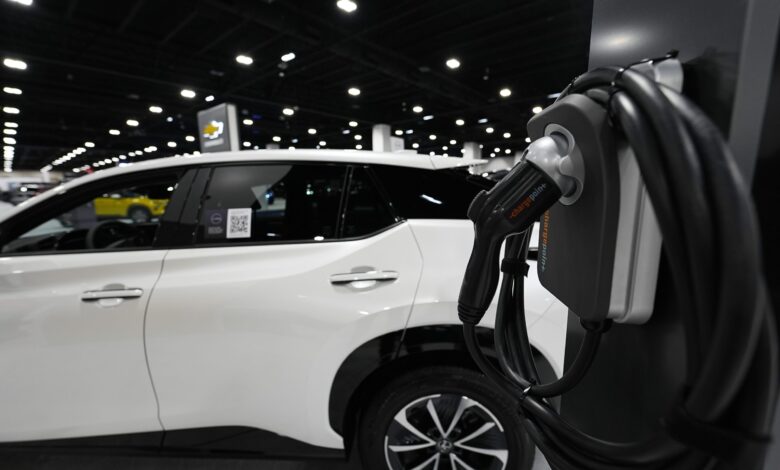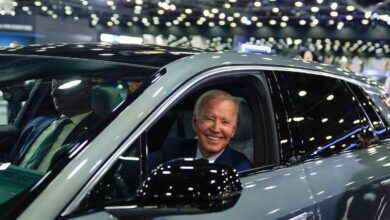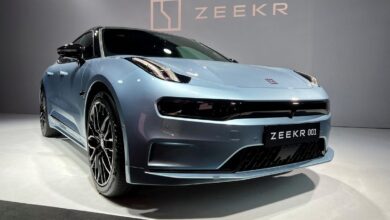Colorado EV sales drop off though green energy leaders say sky remains blue

Sales of clean fuel vehicles in Colorado slowed in the first quarter of 2024 despite a growing stack of lucrative rebates available, according to the Colorado Auto Dealers Association, though some green economy enthusiasts said overall electric vehicle trends are strong.
Battery-only electric vehicles, the largest category of clean fuel combinations, went a bit soft at a time they’re supposed to be on a steady growth arc Colorado needs in order to reach 940,000 EVs on the road by 2030, a long-stated target. A climbing number of EV sales is crucial to both the ozone cuts needed to get out from under EPA sanctions, and to meet the state’s greenhouse gas reduction goals.
Perhaps extra worrisome is that the drop also came as a number of lucrative, stackable incentives for buying EVs kicked in. Lower-income buyers who qualify can pile up federal, state, Xcel and a special cash-for-clunkers deal to get as much as about $21,000 off a new EV.
Despite the incentives,the share of full battery-electric vehicles newly registered in Colorado dropped to 13.8% for the first quarter of 2024, from 16.3% in the last three months of 2023. The raw number of BEV sales was about 6,600, down from about 8,900 in late 2023. That’s out of total new vehicle registrations of about 48,000.
The drop also diverged from overall vehicle sales in Colorado, which rose 2.8%, slower than national sales growth averages but still welcome to dealers making up for sales lost during the pandemic shutdowns.
Combining the two clean-vehicle categories, battery electric and plug-in electric hybrids, put Colorado’s share at 19% of overall sales so far in 2024, down from 20.4% in late 2023.
The news follows signs of similar soft EV markets in California, always the market and policy leader for car sales, and across the rest of the nation.
The Atlas EV Hub information clearinghouse reported nationally that, “following record highs in December 2023, the EV market has been off to a slow start through the first two months of 2024. January saw just over 119,000 light-duty EVs sold which was down 20% from the previous month. February saw sales slip another 10% to just over 107,000, representing the lowest total since February 2023.”
Colorado would have been worse off without all its EV incentives, which helped hold sales relatively steady, said Matthew Groves, chief of the Colorado Auto Dealers Association.
“We’d also like to think it’s because dealers are working collaboratively with the state, not antagonistically,” Groves said, including getting educated on incentives and having them taken off at the cash register whenever possible to ease the buying process.
“Incredible progress” despite slow work to set up Colorado incentives
At least one green energy advocate in Colorado said quarterly changes in EV sales should not be alarming compared to the overall arc of clean fuel growth.
“When I look at the data, I see incredible progress,” said Travis Madsen, transportation program director at the nonprofit Southwest Energy Efficiency Project. He noted that not all the cash Colorado incentives were available until April, as the Public Utilities Commission and Xcel worked out how many different rebates could be “stacked” together for one car.
“I’m not worried about market shifts from quarter to quarter,” he said. “I see a fundamental transformation of vehicle technology underway, I think it is unstoppable, and I think it offers massive benefits for our economy, our health, and our climate. There’s a lot of work left to do to unlock the full benefit, and the transition is likely to happen with some fits and starts.”
Madsen pointed to different numbers kept on the state’s EV “dashboard.”
“There’s no slowdown visible,” he said. The state dashboard says new EV registrations climbed from 10.8% in the fourth quarter of 2023 to just under 11% in the beginning of 2024, Madsen said. Adding in plug-in electric hybrids, considered clean energy vehicles under state rules, and the share climbs from 15.6% in the third quarter of 2023 to 17.1% last quarter.
Other databases may include cars that are bought elsewhere and registered for the first time in Colorado, not just new Colorado sales, Madsen said.
Given the challenges of consistently hitting EV sales targets, CADA’s Groves said, the trade group is glad Colorado regulators did not follow other states in mandating 100% EV sales by 2035. Instead, Colorado settled on an 80% target for 2032, and did not try to mandate markets after that, Groves said.
“Those states that are looking at an internal combustion engine ban in 2035 are looking at it as unattainable and unserious, given the national trendlines in consumer sentiment,” Groves said. “Colorado stepped back and gave a more serious goal, and I think industry got more serious about pursuing it.”
Potential EV sales hit the news again this week with President Joe Biden announcing a 100% tariff on Chinese-manufactured EVs that have U.S. automakers very worried. The small EVs get great reviews for performance and are priced in China at the equivalent of just $12,000.
The Colorado Energy Office, the hub of clean energy and electrification policy for the state, has echoed the view that moderate fluctuations in new EV sales are expected. Incentives take time to fully kick in, companies phase out some models and consumers wait for new ones and higher interest rates on loans complicate decisions.
“We’re excited Colorado ranks third in the nation in EV market share, up from sixth this time last year, and that plug-in hybrid electric vehicles sales continue to increase, representing the largest PHEV market share in the country,” energy office chief Will Toor said. “We are also thrilled that the year-over-year growth is significant, with a 44% increase in total EV market share between Q1 2023 and Q1 2024, growing from 13.2% to 19%.”
News of a “bumpy ride,” Madsen said, “applies more to the national story, and we’re doing better in Colorado to manage those bumps with a very comprehensive policy environment.”



